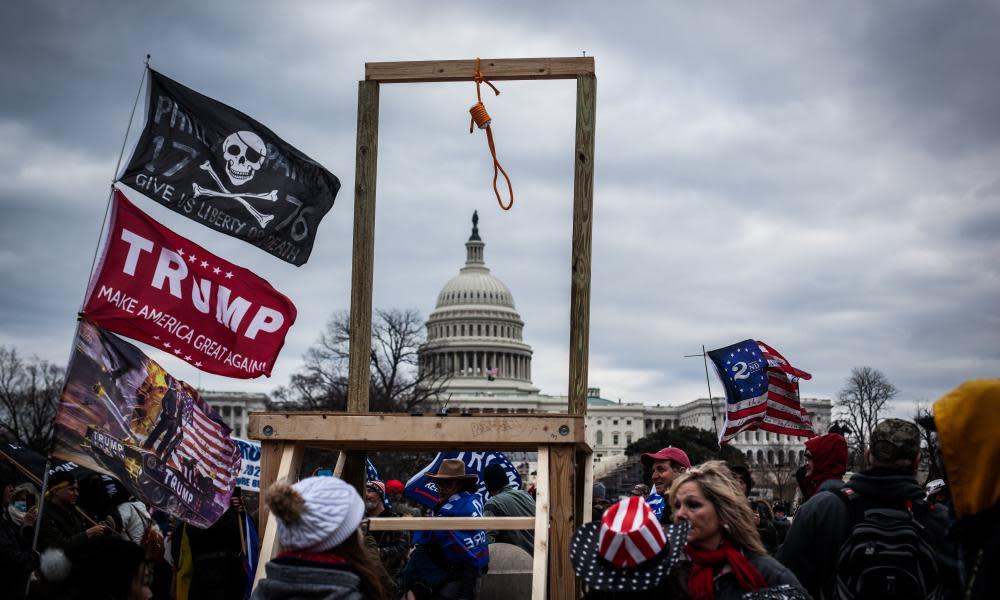Trump White House records can be given to Capitol attack panel, judge rules

- Oops!Something went wrong.Please try again later.
A federal judge in Washington has ruled that hundreds of pages of White House records from the Trump administration can be turned over to the House committee investigating the deadly 6 January attack on the Capitol, defying objections from Donald Trump.
The decision, handed down late on Tuesday by the US district judge Tanya Chutkan, clears the way for the National Archives, the federal agency holding Trump’s White House materials, to start transmitting the records requested by Congress as early as Friday, though attorneys for Trump immediately vowed to appeal the ruling.
Trump sued to block the release of materials, claiming presidential executive privilege.
But Chutkan stated: “His position that he may override the express will of the executive branch appears to be premised on the notion that his executive power ‘exists in perpetuity’... but presidents are not kings, and plaintiff is not president.”
In her ruling, she further said: “The court holds that the public interest lies in permitting – not enjoining – the combined will of the legislative and executive branches to study the events that led to January 6,” Chutkan wrote in a 39-page opinion that delivered a major win to the select committee.
The White House records in question are among the most sensitive: visitor logs, telephone records and other documents from the files of Trump’s former White House chief of staff Mark Meadows as well as the former deputy White House counsel Patrick Philbin.
Related: US Capitol attack committee issues subpoenas to 10 senior Trump officials
Among the materials the committee wants to access are video clips, including out-takes of the video Trump taped on the evening of 6 January, when he asked rioters to go home but he also praised them, saying: “We love you, you’re very special.”
A source that was present during the taping of that video told ABC News that there were many earlier takes of the president’s message but they were rejected for broadcast because the president heaped praise on the insurrectionists without telling them to leave the Capitol and grounds, the Good Morning America show reported on Wednesday.
In total, the National Archives has indicated Trump was invoking executive privilege protections to block the release of at least 750 pages of records that pertained to the select committee’s request in August for records about Trump’s efforts to subvert the 2020 election, including events surrounding the attack on the Capitol by a crowd of his extremist supporters on 6 January.
The Biden administration has already waived executive privilege for all of the documents in the first tranche of records requested by the select committee, but Trump sued the panel and the National Archives last month in an attempt to halt their release.
House investigators have been pursuing the records for weeks as they undertake a far-reaching inquiry into the extent of the former president’s involvement in the Capitol attack and whether he had advance knowledge of the insurrection that left five dead and 140 injured.
Bennie Thompson, the chair of the investigating committee and a Democratic congressman from Mississippi, said the federal judge’s ruling was a “big deal”.
“We have the law on our side, and you know, we are a nation of laws,” Thompson told CNN.
The ruling from the US district court in Washington DC came after the select committee issued 10 new subpoenas to Trump administration officials, including Trump’s former senior adviser Stephen Miller and press secretary Kayleigh McEnany.
The subpoenas, which demand documents and testimony, are focused squarely on activities involving the White House and come a day after the select committee subpoenaed other top Trump associates who aimed to undercut the results of the 2020 election.
The select committee gave the 10 Trump officials until 23 November to comply with the document requests in the subpoena, with deposition dates scheduled through December. It was not immediately clear on Tuesday whether any of the officials would cooperate.

